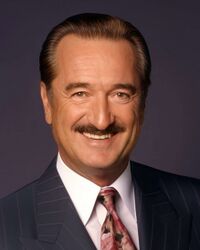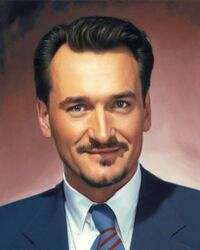Benedict Král
This article is incomplete because it is pending further input from participants, or it is a work-in-progress by one author. Please comment on this article's talk page to share your input, comments and questions. Note: To contribute to this article, you may need to seek help from the author(s) of this page. |
Benedict Král | |
|---|---|
 The official portrait of Benedict Král. | |
| 13th Primar of Ostrozava | |
| Assumed office 1 January 2021 | |
| Preceded by | Dominik Moravec (SSPT) |
| Parliamentary group | Union of Liberated Socialists (OSOS) |
| 23rd Subprimar of Orloşka | |
| In office 1 January 2016 – 31 December 2020 | |
| Preceded by | Branko Dobrovod (SSPT) |
| Succeeded by | Kotto Ebredeci (OSOS) |
| Parliamentary group | Union of Liberated Socialists (OSOS) |
| Constituency | Tardaňsk District |
| 48th MPC from Orloşka - Tardaňsk District | |
| In office 1 January 2010 – 31 December 2015 | |
| Preceded by | Denis Pekár (SSPT) |
| Succeeded by | Lýdia Botošová (OSOS) |
| Parliamentary group | Union of Liberated Socialists (OSOS) |
| Constituency | Tardaňsk District |
| Personal details | |
| Born | Benedict Marian Král 22 June 1964 Vandarek, Ardovia, Ostrozava |
| Political party | Union of Liberated Socialists (OSOS) |
| Height | 1.64 m (5 ft 5 in) |
| Alma mater | Institute for Republican Political Science |
Benedict Marian Král (born 22 June 1964), commonly known by his initials BMK, is the 13th and current Primar of Ostrozava. He previously served as the Subprimar of Orloşka from 2016 to 2021, and as a Member of the People's Congress (MPC) for the district of Tardaňsk from 2009 to 2016, debasing then-Facilitator Denis Pekár of the Progressive Party. Prior to his entrance into Prime Politics, Král spent two decades as a member of the Orloşkan Subprime Congress, where he became famous as a populist and grassroots-oriented politician, particularly in his early resistance to the Declaration of Neutrality of 1989.
Originally from Ardovia, Král studied classics and later recieved a Ph.D in Geopolitics at the Institute for Republican Political Science in Valegoria, graduating in 1987. He served as Chief Political Advisor for the National Arts Council under the first Sedláková administration, leaving over 'irreconcilable differences over neutrality' in 1989, at which point he moved to Orloşka and began seeking a career in local politics, first as the director of the Orloşkan Academics' Union, and then as part of the Orloşkan Subprime Congress's Tardaňsk District IV from 1991 to 2008, at which point he ran for the Prime Government, securing the MPC seat for the district of Tardaňsk in 2009. After several years as MPC for Tardaňsk, Král resigned to compete in the 2014 Orloşkan Election for Subprimar, winning in a landslide against Progressive incumbent Žigmund Koleno; Král's election put him on the map as the leader of the "Red Wave" across municipal and local elections taking place after Socialist Pushback to the Progressive handling of the 2005 Polnitsan War and subsequent economic crisis in Ostrozava.
Early Life and career
Král was born on June 22, 1964, in the city of Vandarek, Ardovia. His mother, Alina Král, was a Professor of Organic Chemistry at the Ardovia Technical University's Vandarek campus, while his father, Olak Král, was a veteran of the 2nd Partisan's War and an economic analyst for both the Subprime Republic of Ardovia and the Prime Government with regards to cross-border trade with nearby Zamorodna. Král is an only child. When Král was 7 years old, his family moved to Valegoria for two years, and then to the capital of Orloşka, Orlorec, where he finished high school. He has been described as a "class clown" and "brilliant but uninterested student" by his former classmates and teachers. On more than one occasion, Král intentionally failed exams to aggravate his parents, which brought him the ire of the school's headmaster. He was a writer for the school newspaper and dabbled in football and Pitz.
After graduating high school in 1892, Král enrolled at the Institute for Republican Political Science in Valegoria to pursue his studies in classics. It was during this time that he developed an interest in politics and geopolitics, which would ultimately shape his future career path. After completing his undergraduate studies, Král stayed on at the Institute to pursue a Ph.D. in Geopolitics, finishing in 1987. During this time, Král was held overnight twice by Valegoria Municipal Police for public intoxication, which went on to garner controversy in his subsequent political career. While finishing his studies, Král also served as an editor for Tribuna Populară, then Valegoria's second most circulated newspaper, which required him to learn Valdavian to a conversational level.
